Friday, June 30, 2006
Court Ruling Portrays Questionable Legal Justification For NSA Program
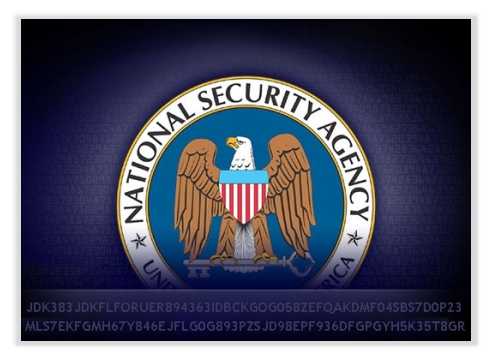
The Supreme Court ruling that Bush overstepped his powers in dealing with the captives at Guantanamo has ramifications for his administration's usurpations of the prerogatives of the other branches of government.
The ruling indicates that the NSA warrantless surveillance programs were extra-legal.
Legal analysts said that the court's opinion could lead to a challenge to the National Security Agency's domestic surveillance program, because wiretapping is already covered by a federal statute, the Foreign Intelligence Surveillance Act, just as military commissions were, in the court's view, covered by the UCMJ.
"The same reasoning would seem to apply to the NSA case, because the argument that the authorization to use military force enables them to ignore FISA goes down the drain," said Joseph P. Onek, senior counsel of the Constitution Project, a Washington-based civil liberties organization that opposed the commissions.
In other words, the Court ruled that the administration was not stepping into a vacuum in which the Congress had failed to make their wishes known, but was acting in contravention of an established law.
Everyone already knew this, but having the Supreme Court's official imprimatur on the issue will force the administration to rely solely upon the Article Two argument instead of juggling AUMF also.
Thursday, June 29, 2006
Supreme Court Rules Conflict With Al Qaeda Under Geneva Convention

The U.S. Supreme Court today ruled that President Bush's plan to subject Guantanamo detainees to judgment by military commissions is unconstitutional.
Not only that, but the Court ruled that captured terrorists, including Al-Qaeda, have to be treated in accordance with the Geneva Convention rules for detained prisoners of war.
From SCOTUSblog (via AMERICAblog):
(T)he Court held that Common Article 3 of Geneva applies as a matter of treaty obligation to the conflict against Al Qaeda. That is the HUGE part of today's ruling. The commissions are the least of it. This basically resolves the debate about interrogation techniques, because Common Article 3 provides that detained persons "shall in all circumstances be treated humanely," and that "[t]o this end," certain specified acts "are and shall remain prohibited at any time and in any place whatsoever" --including "cruel treatment and torture," and "outrages upon personal dignity, in particular humiliating and degrading treatment." This standard, not limited to the restrictions of the due process clause, is much more restrictive than even the McCain Amendment...
This almost certainly means that the CIA's interrogation regime is unlawful, and indeed, that many techniques the Administration has been using, such as waterboarding and hypothermia (and others) violate the War Crimes Act (because violations of Common Article 3 are deemed war crimes).
Another One Bites The Dust

The party that tries to portray itself as standing for moral values lost another operative this week.
A political consultant whose company was behind a television ad accusing the Clinton-Gore administration of giving away nuclear technology was convicted of child molestation charges.
A jury deliberated almost two days before convicting Carey Lee Cramer, 44, of aggravated sexual assault of a child, two counts of indecency with a child by contact and one count of indecency with a child by exposure.
The sentencing phase of the trial was scheduled to begin Wednesday. Cramer faces up to 149 years in prison.
Cramer, who now lives in Tucson, Ariz., gained national attention during the 2000 presidential election when his company created the ad that accused the administration of giving nuclear technology to China in exchange for campaign contributions...
Cramer, who had been free on bond since his 2005 arrest, was taken into custody on a $4 million appeal bond after the verdict, The (McAllen) Monitor reported in its Wednesday editions.
At least Bill Clinton had the decency to indulge himself with an adult woman.
In case anyone thinks Cramer is an isolated case, here is a list of other goopers who have pushed the envelope beyond socially acceptable boundaries.
Wednesday, June 28, 2006
Cybersecurity Report Says That A Single Person Could Throw An Election

A team of experts recently conducted an exercise in a fictitious battleground state to test the security of electronic voting machines, and how possible it would be to technically manipulate the results.
The experts thought about all the ways to do it. And they concluded in a report issued yesterday that it would take only one person, with a sophisticated technical knowledge and timely access to the software that runs the voting machines, to change the outcome.
The report, which was unveiled at a Capitol Hill news conference by New York University's Brennan Center for Justice and billed as the most authoritative to date, tackles some of the most contentious questions about the security of electronic voting.
The report concluded that the three major electronic voting systems in use have significant security and reliability vulnerabilities. But it added that most of these vulnerabilities can be overcome by auditing printed voting records to spot irregularities. And while 26 states require paper records of votes, fewer than half of those require regular audits.
"With electronic voting systems, there are certain attacks that can reach enough voting machines . . . that you could affect the outcome of the statewide election," said Lawrence D. Norden, associate counsel of the Brennan Center.
With billions of dollars of support from the federal government, states have replaced outdated voting machines in recent years with optical scan ballot and touch-screen machines. Activists, including prominent computer scientists, have complained for years that these machines are not secure against tampering...
At yesterday's news conference, the push for more secure electronic voting machines, which has been popular largely on the left side of the political spectrum since the contested outcome of the 2000 presidential election in Florida, picked up some high-profile support from the other side.
Republican Reps. Tom Cole (Okla.) and Thomas M. Davis III (Va.), chairman of the House Government Reform Committee, joined Rep. Rush D. Holt (D-N.J.) in calling for a law that would set strict requirements for electronic voting machines. Howard Schmidt, former chief of security at Microsoft and President Bush's former cybersecurity adviser, also endorsed the Brennan report.
"It's not a question of 'if,' it's a question of 'when,' " Davis said of an attempt to manipulate election results.
For a real world study of voting skullduggery in the 2004 presidential election, readers can look to Robert F. Kennedy Jr.'s well-footnoted study published last month in Rolling Stone.
Tuesday, June 27, 2006
White House Staffers Not Above Accepting Subsidized Travel

White House staffers have caught the free travel bug that has previously been endemic to Capitol Hill, according to Newsweek.
As Congress debates a crackdown on members' and their staffs' accepting travel paid for by outside interests, newly filed records show Capitol Hill lawmakers aren't Washington's only frequent fliers. According to filings with the Office of Government Ethics, White House staffers have accepted nearly $135,000 in free trips since November 2004. Among those picking up the tab: some of the president's top business supporters, including the National Association of Manufacturers, and dozens of conservative and religious groups, among them the Southern Baptist Convention, Focus on the Family and the Federalist Society.
Records list most trips as speaking engagements or panel discussions -- including White House deputy chief of staff Karl Rove's $2,600 trip last September to Aspen, where he attended a two-day retreat sponsored by financier Ted Forstmann. Al Hubbard, Bush's top economic adviser, also visited Colorado, reporting a $4,276 trip in June 2005 paid for by the American Enterprise Institute. Bush aides listed trips as far away as Norway, Germany, Latvia, Sweden, the United Kingdom and Australia, where Rove aide Barry Jackson reported a $15,483 jaunt to Sydney to attend a conference on Australian-U.S. relations.
The most frequent traveler: Tim Goeglein, a White House point man for conservative groups, who reported $30,000 in free travel. Records show Goeglein's most frequent destination was Ft. Wayne, Ind., his hometown, where he reported five visits last year. White House spokeswoman Dana Perino says travel is part of "regular outreach," noting that all staffers were invited guests.
Monday, June 26, 2006
Morris Says Lieberman Will Lose Primary To Lamont

Former top Democratic political advisor Dick Morris weighs in on Joe Lieberman's chances in the upcoming primary and recommends a potentially winning strategy for the Republican who cloaks himself in a donkey disguise.
Political Wire asked Dick Morris for his thoughts on the U.S. Senate race in Connecticut:
"I think Sen. Joe Lieberman (D-CT) will lose the primary and will be so crippled by the defeat and Ned Lamont (D) so empowered, that he will lose the general election as an independent. Sen. Jacob Javits (R-NY), in 1980, could have avoided defeat by not fighting the Republican Primary against Sen. Al D'Amato (R-NY) and running as an independent. But D'Amato was so empowered by the primary win and Javits so disempowered that he won the general election with Javits running a poor third.
"Lieberman's correct course of action is to withdraw from the primary and run as an independent. It is the only way he can get re-elected."
Meanwhile, the Norwich Bulletin says that if Lieberman decides to petition his way onto the November ballot as an independent "he will publicly announce his plans prior to the Aug. 8 primary."
Sunday, June 25, 2006
Nonprofit Groups Under Investigation For Assisting Abramoff

Several organizations which operate with the tax benefits of being non-profit groups (perhaps not for much longer, though) are under investigation for laundering cash for disgraced lobbyist Jack Abramoff.
Newly released documents in the Jack Abramoff investigation shed light on how the lobbyist secretly routed his clients' funds through tax-exempt organizations with the acquiescence of those in charge, including prominent conservative activist Grover Norquist.
The federal probe has brought a string of bribery-related charges and plea deals. The possible misuse of tax-exempt groups is also receiving investigators' attention, sources familiar with the matter said.
Among the organizations used by Abramoff was Norquist's Americans for Tax Reform. According to an investigative report on Abramoff's lobbying released last week by the Senate Indian Affairs Committee, Americans for Tax Reform served as a "conduit" for funds that flowed from Abramoff's clients to surreptitiously finance grass-roots lobbying campaigns. As the money passed through, Norquist's organization kept a small cut, e-mails show...
The Senate committee report also details Abramoff's dealings with two others from the College Republicans crowd: Ralph Reed, former Christian Coalition executive director; and Amy Moritz Ridenour, president of the National Center for Public Policy Research, which sponsored a golf trip in 2000 to Scotland for then-Rep. Tom DeLay (R-Tex.).
"Call Ralph re Grover doing pass through," Abramoff wrote in a stark e-mail reminder to himself in 1999, a year in which Norquist moved more than $1 million in Abramoff client money to Reed and Christian anti-gambling groups. Reed was working to defeat lotteries and casinos that would have competed with Abramoff's tribal and Internet gambling clients...
E-mails show that Abramoff also moved client money through a conservative Jewish foundation called Toward Tradition, run by longtime Abramoff friend Rabbi Daniel Lapin. In January 2000, when Reed sent Abramoff an $867,000 invoice to be billed to a Choctaw official, Abramoff responded: "Ok, thanks. Please get me the groups we are using, since I want to give this to her all at once." Reed responded: "Amy, Grover, Lapin and one other I will get you."
Abramoff tapped the same cluster of tax-exempt groups in 2000 to help defeat legislation to ban gambling on the Internet. Abramoff's client, an online gambling services company called eLottery, donated money to ATR, the policy research center and Toward Tradition.
In May 2000, just before a key vote on the anti-gambling bill, the research center paid for the Scotland trip for then-House Majority Whip DeLay. Toward Tradition hired the wife of DeLay aide Tony C. Rudy, who later pleaded guilty to conspiring to corrupt public officials, saying his wife was paid in exchange for his official actions. Lapin has said his hiring of Lisa Rudy was not connected to any eLottery donations...
Tax experts said it is impermissible for a tax-exempt organization to act as a pass-through for money destined for private business purposes.
"It's not a tax-exempt activity to act as a bag man for Jack Abramoff," said Marcus S. Owens, a tax lawyer at Caplin & Drysdale and a former Internal Revenue Service official.
Saturday, June 24, 2006
SWIFT Gave U.S. "All The Data"

The CIA/Treasury program that gained access to international money transfer records--which was portrayed in initial reports as "limited"--turns out to have involved the U.S. receiving "all the data" from the European-based consortium.
Administration officials tacitly acknowledged that the information at their disposal is even greater than the initial press reports about the program indicated.
According to Treasury Secretary John W. Snow, when the administration first requested information from SWIFT after Sept. 11, in subpoenas that were fairly narrowly drafted , the consortium said it couldn't comply because it didn't have the ability to extract the particular information from its database.
"So they said, 'We'll give you all the data,' " Snow said, the idea being that federal agents would design methods of searching it. But he hastened to add that the data were handed over only on condition that strict safeguards would be implemented.
Under various bank secrecy laws passed by Congress over the past 35 years, U.S. banks are forbidden to hand over information about individual customers' accounts, unless government agents obtain a court-authorized subpoena in the course of an investigation.
One Republican Senator sees an interesting pattern here by the administration:
Senator Arlen Specter, Republican of Pennsylvania and chairman of the Senate Judiciary Committee, said he had sent letters on Friday to both Treasury Secretary John W. Snow and Attorney General Alberto R. Gonzales on the issue. While he declined to release the letters, he said he was concerned about the legal authority for the operation...
The senator said he was particularly troubled that the administration had expanded its Congressional briefings on the financial tracking program in recent weeks after having learned that The New York Times was making inquiries.
"Why does it take a newspaper investigation to get them to comply with the law?" the senator asked. "That's a big, important point."
Friday, June 23, 2006
Ney Misled Investigators In Abramoff Case

A newly released report (pdf) detailing the results of a congressional investigation into lobbyist Jack Abramoff's dealings with Indian tribes paints an unflattering picture of Rep. Robert Ney.
In the fall of 2004, Rep. Robert W. Ney (R-Ohio) told Senate investigators that he was unfamiliar with a Texas Indian tribe represented by lobbyist Jack Abramoff. Days later, evidence emerged that the congressman had held numerous discussions with Abramoff and the Indians about getting Congress to reopen their shuttered casino.
Ney's statements to staff members of the Senate Indian Affairs Committee were included in the panel's 357-page report on tribal lobbying, released yesterday after two years of hearings and investigation. Accompanied by more than 1,000 pages of e-mails and financial ledgers, the report catalogues the now mostly familiar story of how Abramoff and his lobbying team of former congressional aides bilked half a dozen tribes out of more than $80 million...
Ney's comments to the panel could add to his problems with the Justice Department. Federal prosecutors have secured guilty pleas from Abramoff and three former associates implicating Ney in a string of official acts allegedly performed in exchange for favors such as a golf trip to Scotland and campaign contributions...
Ney's Nov. 12, 2004, interview with committee staffers took place amid a flurry of front-page newspaper articles about how Abramoff and his associate Michael Scanlon had flimflammed the Tigua tribe. The two first worked secretly with anti-gambling forces to close the casino and then convinced the tribe that for $4.2 million, they could get Congress to come to its rescue.
In his interview with the committee staff, "Congressman Ney said he was not at all familiar with the Tigua" and could not recall meeting with members of the tribe, the report said.
Six days after the interview, Tigua representatives testified at a committee hearing that Abramoff had set up a lengthy meeting with Ney in his office in August 2002 as well as a conference call, and that the congressman had assured them he was working to insert language that would reopen their casino into an unrelated election reform bill. Team Abramoff and the tribe that year became Ney's biggest donors, contributing $47,500 to his campaign committees...
Ney's statements to the committee have been contradicted by others as well, including his former longtime chief of staff, Neil G. Volz, in admissions he made this year as part of his guilty plea to corruptly seeking to influence Ney on the Tigua issue...
Brian Walsh, a spokesman for Ney, said yesterday that the congressman's meeting with the committee "was a voluntary meeting -- it was not conducted under oath."
The committee report said that those witnesses who were not placed under oath were reminded of "the applicability of the false statements act" and of statutes dealing with obstruction of a congressional investigation.
Thursday, June 22, 2006
GOP Decides Iraq War Will Be A Positive Issue In Midterms
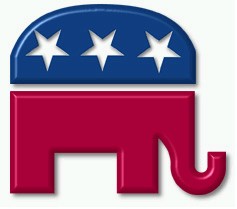
The Republicans have found what they think will be a winning issue on which to campaign this election season.
It is the Iraq war.
Just a few weeks ago, some Republicans were openly fretting about the war in Iraq and its effect on their re-election prospects, with particularly vulnerable lawmakers worried that its growing unpopularity was becoming a drag on their campaigns.
But there was little sign of such nervousness on Wednesday as Republican after Republican took to the Senate floor to offer an unambiguous embrace of the Iraq war and to portray Democrats as advocates of an overly hasty withdrawal that would have grave consequences for the security of the United States. Like their counterparts in the House last week, they accused Democrats of espousing "retreat and defeatism."
That emerging Republican approach reflects, at least for now, the success of a White House effort to bring a skittish party behind Mr. Bush on the war after months of political ambivalence in some vocal quarters. As President Bush offered another defense of his Iraq policy during a visit to Vienna on Wednesday, Republicans acknowledged that it was a strategy of necessity, an effort to turn what some party leaders had feared could become the party's greatest liability into an advantage in the midterm elections...
People who attended a series of high-level meetings this month between White House and Congressional officials say President Bush's aides argued that it could be a politically fatal mistake for Republicans to walk away from the war in an election year.
A senior adviser to Mr. Bush said the White House had concluded that it was better to plunge aggressively into the debate on Iraq than to let Democrats play upon clear, public misgivings about the war. "This is going to be a big issue in this election," said the adviser, who was granted anonymity in exchange for agreeing to describe strategic considerations about the war. "Better to shape and fight it -- as good and strongly as you can -- than to try to run away from it."...
The strategy still required calming some uneasy Republicans, administration officials said. A participant in one White House meeting, who would discuss the intraparty debate only after being promised anonymity, said Mr. Bush's aides sought to convince lawmakers that the political situation was not so dire because polls had also shown dissatisfaction with progress in Iraq in 2004.
The American people are not as gullible as the GOP obviously assumes. The increasing unpopularity of the war is not due to anyone's talking points. It is due to the deteriorating situation on the ground in Iraq.
This war of choice was pushed upon the nation by a co-ordinated series of lies and malfeasence by the administration. If the war could have been won--it already would have been won. The Republicans will have to face the reality of their predicament at the polls in November.
Wednesday, June 21, 2006
Ex-White House Aide Found Guilty
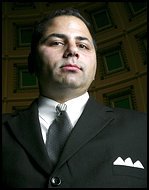
The Republicans involved in the Abramoff bribery scandal have been turning on each other en masse, becoming cooperating witnesses in the expanding federal prosecutions of their cohorts.
Yesterday, the first defendant who chose to go to trial rather than plead guilty and cooperate with the prosecutors discovered that he made a losing bet.
A federal jury found former White House aide David H. Safavian guilty yesterday of lying and obstructing justice, making him the highest-ranking government official to be convicted in the spreading scandal involving disgraced former lobbyist Jack Abramoff.
Safavian, a former chief of staff of the General Services Administration, was convicted in U.S. District Court here of covering up his many efforts to assist Abramoff in acquiring two properties controlled by the GSA, and also of concealing facts about a lavish weeklong golf trip he took with Abramoff to Scotland and London in the summer of 2002.
This was the first Abramoff-related legal action to go to trial and face a jury. Several legal experts said the case could embolden federal prosecutors to seek additional indictments against cronies of Abramoff, who has been cooperating with the Justice Department since pleading guilty in January to corrupting public officials...
The jury found him guilty of obstructing an inquiry by the inspector general's office of the GSA and of lying to the Senate Indian Affairs Committee, a GSA ethics officer and the GSA inspector general. He was acquitted of obstructing the Senate's probe. He faces up to 20 years in jail and $1 million in fines; sentencing was set for Oct. 12...
Safavian is the fifth person to be found guilty in legal actions connected to Abramoff, the once-powerful Republican lobbyist who has pleaded guilty to charges of fraud, tax evasion and conspiracy to bribe government officials. Like Abramoff, the other four negotiated plea agreements and did not go to trial. One of those, Neil G. Volz, a congressional aide-turned-lobbyist, testified against Safavian two weeks ago...
Besides Volz, the Justice Department has gotten guilty pleas from Abramoff associates Michael Scanlon, a public relations executive; Adam Kidan, a partner of Abramoff's in a Florida gambling-boat investment; and lobbyist Tony C. Rudy, once a top aide to former House majority leader Tom DeLay (R-Tex.).
Several congressmen (and one prominent former House member) are said to be in the crosshairs of the prosecutors who are unthreading the tangled affairs of Abramoff.
Tuesday, June 20, 2006
Rumsfeld Questioned In Boeing Tanker Lease Probe
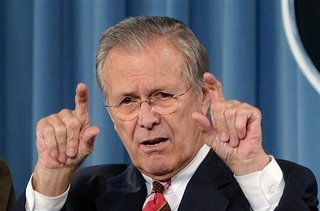
Defense Secretary Donald Rumsfeld was questioned by investigators from the Pentagon's inspector general's office in 2005 about his knowledge of the tanker lease scandal that sent a DOD official and a Boeing employee to prison.
Rumsfeld did not come across as the highly competent manager that he tries to portray publicly.
Rumsfeld cited poor memory, loose office procedures, and a general distraction with "the wars" in Iraq and Afghanistan to explain why he was unsure how his department came to nearly squander $30 billion leasing several hundred new tanker aircraft that its own experts had decided were not needed...
The Air Force in 2004 canceled its plan to lease the tankers from the Boeing Co., amid allegations of improper collusion with the company. Former Air Force procurement officer Darleen A. Druyun and one of the interlocutors at Boeing were sent to prison; subsequent investigations showed that Druyun manipulated other large Air Force contracts to benefit military contractors.
After a Senate investigation unearthed evidence that the tanker purchase was viewed inside the Pentagon as a politically tinged bailout for Boeing, Air Force Secretary James G. Roche and his top acquisitions deputy resigned from government. Boeing's chief executive was replaced, and last month the firm agreed to pay $615 million to settle all liability for the tanker scandal and an unrelated impropriety. It was the largest penalty paid by a defense contractor...
Rumsfeld is a former business executive and White House official who published a set of "Rumsfeld's Rules" that include the injunction: "Be precise -- a lack of precision is dangerous." But when investigators asked him whether he had approved the Boeing tanker lease in May 2003 -- despite widespread violations of Pentagon and government-wide procurement rules along the way -- Rumsfeld said: "I don't remember approving it. But I certainly don't remember not approving it, if you will."
Asked whether his subordinates, including former undersecretary of defense Edward C. "Pete" Aldridge, had accurately invoked Rumsfeld's approval when they signed documents authorizing the Boeing tanker lease to go forward, Rumsfeld said, "I may very well have said yes. I just don't remember. . . . I am not going to sit here and quibble over it." He did say he remembered approving a gun for a tank in 1976, during his first time as defense secretary.
When pressed about the tanker lease -- the largest such lease in U.S. history -- Rumsfeld offered two explanations for his distance from it. The first was related to his focus on what he called "the global war on terror," including the wars in Afghanistan and Iraq, and what he termed the "continuing difficulties" with the Taliban and al-Qaeda...
Asked if he was aware of concerns about the proposed Air Force lease from Capitol Hill and the Pentagon's own analysts, Rumsfeld responded, "I don't know what I knew then, compared to what I know now. . . . I am not able to go back and say . . . what did I know at a certain moment back in that period."...
The investigators tried a different tack. Tell us, one said, about the extent and nature of conversations with the White House about the tanker lease. The question related to the fact that in 2002 President Bush asked then-White House Chief of Staff Andrew H. Card Jr. to help reach a deal between the Pentagon and Boeing, which had substantial clout on Capitol Hill and was a major contributor to Bush's inaugural celebration.
"I have been told," Rumsfeld said, "that discussions with the president are privileged, and with his immediate staff." Large portions of text on the next five pages of the 38-page interview transcript were blacked out in the copy provided to The Post...
(I)n the past six years, while Rumsfeld occasionally mentioned procurement problems in his public appearances, he delivered only one major speech about the need for reform in how the Pentagon buys weapons. He complained in the speech that "our financial systems are decades old" and noted estimates that "we cannot track $2.3 trillion in transactions." He also said that the acquisition process was being improved and that "we now budget based on realistic estimates."
Rumsfeld's speech was delivered on Sept. 10, 2001.
There are no such things as coincidences.
Monday, June 19, 2006
Democrats Push Resolution For Phased Withdrawal From Iraq

After last week's Republican stage-managed "debate" on the Iraq war, Senate Democrats are introducing a resolution calling for a timetable on withdrawing American troops from that beleaguered nation.
Congressional Democrats, seizing on public discontent over the war in Iraq, will offer legislation this week calling for a phased withdrawal of troops from Iraq and a shifting of forces to other nations, where supporters say American soldiers will be less likely to come under attack.
The resolution, crafted by Democratic Senators Jack Reed of Rhode Island and Carl Levin of Michigan, will headline a second week of debate in Congress over the state of the war. It is the first real debate Congress has held on the war since the US invasion in early 2003.
Senate Democrats, many of whom voted to authorize force in Iraq but have become critics of the war, will unveil a resolution today demanding that President Bush begin phasing out US troop presence in Iraq this year.
The resolution, expected to come to the floor as early as tomorrow, also would call on Bush to provide a plan to redeploy remaining troops after 2006, but it does not specify where troops should be moved and how many might come home.
Under the proposal, a small contingent of American troops would be kept in Iraq to train local forces so they can take control of their own country.
"An open-ended time commitment is no longer sustainable," Senator Dianne Feinstein , Democrat of California, said on CNN's "Late Edition" yesterday.
The nation needs "a timetable, some goals, some discussion with the Congress by the administration," she said. "The president might not have wanted to have done that early on, but three years and three months and a bogging down, I think, suggests that the time has come for some discussion as to where we go from here."
Saturday, June 17, 2006
Pro-Iraq War Talking Points May Have Violated Law Against Propaganda

They should have used better tradecraft in their propaganda program.
The pro-war lawmakers in Thursday's "debate" on our Iraq policy were supplied with talking points crafted--either by DOD or the NSC--which one lawmaker is alleging is illegal either way.
(Lawmakers) went into the debate armed with political talking points. The most unusual came via a document sent out by Office of the Secretary of Defense to an assortment of congressional aides, as well as to the Iraqi Embassy and the U.S. Ambassador to Belgium. The 74-page document is an exhaustive rebuttal of criticisms of the war and a defense of the administration's conduct of the war.
The document, labeled "Iraq floor debate prep book," was emailed on Wednesday afternoon to a handful of Democrats as well as Republicans -- and was then abruptly recalled. Thursday afternoon, Sen. Frank Lautenberg (D-N.J.) sent a letter to Rumsfeld complaining that his office had spent "taxpayer dollars to produce partisan political documents." Lautenberg also suggested that the document may have violated laws prohibiting the Executive Branch from using taxpayer dollars for lobbying and propaganda activities.
The Pentagon later said the document was produced by the National Security Council -- but did not offer an explanation as to why it was sent out by the Office of the Secretary of Defense.
Republicans on the Hill were not happy that the document was sent to Democrats -- or that it was produced at all. "I've never seen anything like it," said one Republican aide, noting that the document went well beyond a Statement of Administration Policy. "I mean, a 74-page document -- are you kidding me?" The aide added: "It did more harm than good for the Republican cause."
Friday, June 16, 2006
New Jersey Issues Subpoenas Over NSA Program

The telephone companies who may have participated in the NSA warrantless surveillance programs are receiving unwanted attention from the state of New Jersey.
The New Jersey attorney general has issued subpoenas to five telephone companies to determine whether any of them violated the state's consumer protection laws by providing records to the National Security Agency. Experts say it is the first legal move by a state to question the agency's program to compile calling records to track terrorist activities.
On Wednesday, the United States filed a lawsuit to block the subpoenas, setting up a legal showdown pitting the state's authority to protect consumers' rights against the federal government's national security powers.
"People in New Jersey and people everywhere have privacy rights," the state's attorney general, Zulima V. Farber, said on Thursday. "What we were trying to determine was whether the phone companies in New Jersey had violated any law or any contractual obligations with their consumers by supplying information to some government entity, simply by request, and not by any court order or search warrant."
This latest confrontation over the invocation of national security began last month, when Ms. Farber issued the subpoenas to the companies -- AT&T, Verizon, Qwest, Sprint Nextel and Cingular Wireless -- to determine whether they had turned over the phone records to the federal government without a court order, in possible violation of state laws.
But when the Justice Department filed suit in United States District Court here to block those subpoenas -- a suit that Ms. Farber received on Thursday -- it asserted that the state was straying into a federal matter, and that compliance with the subpoenas would imperil national security.
As a matter of national security policy, the dispute represents the latest twist in the controversy over the boundaries of domestic spying and personal privacy. But as a matter of government practice and legal precedent, the dispute is significant because it transforms what had primarily been a fight between the federal government and civil liberties groups into a far knottier one pitting federal authorities against state ones.
Thursday, June 15, 2006
Republican Label May Be Albatross For Some In Midterms

Maybe they can run as "Other."
Republican Rep. Christopher Shays cites his differences with President George W. Bush, produces a chart outlining his moderate voting record and pledges his independence from party leaders in Congress.
His Connecticut colleague, Republican Rep. Rob Simmons, says working with Democrats comes naturally in a district where voters favored Democratic presidential nominee John Kerry over Bush by 10 percentage points in 2004.
For Shays, Simmons and other Republicans running for Congress in Democratic-leaning or swing districts in November, playing down their party label and playing up their independence has become a matter of political survival in a year when "Bush" can be a dirty word.
"This would not be a close election if George Bush was popular. This would not be a close election if there wasn't a war in Iraq," said Shays, who is embroiled in a tight race with Democrat Dianne Farrell.
Wednesday, June 14, 2006
Iraq War Debate Scheduled In Congress

Tomorrow, the House of Representatives will be conducting a debate about the Iraq war that is being seen by some as a trap to portray Democrats as hostile to the U.S. military.
At time of writing, the text of the resolution to be debated had not been released, but congressional sources indicated that it would frame the Iraq war as part of the broader war on terror, a point of controversy. Many war critics argue that the US role in Iraq has deflected attention from the larger war on terror, and thus antiwar members may feel compelled to vote against the resolution. But that may prove politically risky, as the resolution will also express support for American troops, and no member wants to be seen opposing the men and women in harm's way.
At a highly politicized time, with the fall midterm elections approaching and future control of Congress in question, some political analysts see risks for both parties in an Iraq debate. Public support for the war has been on a long, downward slide, and Bush's own job approval rating and policy agenda have been damaged by Iraq more than anything else.
"I don't think the floor is the place to have a debate on Iraq - ours is not a parliamentary system," says GOP strategist Ed Rollins, who argues that such discussion is better handled by members in their districts. "If you get into a big all-out debate, it becomes a referendum on whether the president is right or whether those who voted for it are right. It's not a pretty thing for the public to watch, especially for our troops in the field."
Other Republicans say that with public opinion on the war so low, Bush and his supporters have nowhere to go but up.
The debate could also serve to highlight divisions among Democrats over the war. Until now, Republicans have suffered most of the political pain over Iraq, and Democrats have managed to keep their differences away from broad public scrutiny.
Tuesday, June 13, 2006
Karl Rove: Cooperating Witness?

Karl Rove's lawyer has announced that his client is no longer facing prosecution in the "Plamegate" case.
I'm sure "The Architect" is pleased. Scooter Libby and others may not have cause to celebrate the news.
People in Washington who have closely followed the case are saying that there is a fairly good chance that special prosecutor Patrick J. Fitzgerald has persuaded Rove to testify against other administration officials.
The decision by the prosecutor, Patrick J. Fitzgerald, announced in a letter to Mr. Rove's lawyer, Robert D. Luskin, lifted a pall that had hung over Mr. Rove who testified on five occasions to a federal grand jury about his involvement in the disclosure of an intelligence officer's identity.
In a statement, Mr. Luskin said, "On June 12, 2006, Special Counsel Patrick Fitzgerald formally advised us that he does not anticipate seeking charges against Karl Rove."
Perhaps the letter is a cooperating witness agreement.
In his statement Mr. Luskin said he would not address other legal questions surrounding Mr. Fitzgerald's decision. He added, "In deference to the pending case, we will not make any further public statements about the subject matter of the investigation. We believe that the Special Counsel's decision should put an end to the baseless speculation about Mr. Rove's conduct."
Luskin's failure to "address other legal questions surrounding Mr. Fitzgerald's decision" is interesting in light of the lawyer's usual logorrhea in communications with the fourth estate.
Mr. Fitzgerald's spokesman, Randall Samborn, said he would not comment on Mr. Rove's status.
The Republicans have a critical need for Rove's talents for this year's election season. Maintaining majority status will be essential to avoid the ramifications of several of the administration's more controversial policies.
As one source told me this morning, "the GOP needs Rove more than they need Cheney."
Hmm...
Monday, June 12, 2006
Western Governors Say Time Is Now To Act On Global Warming

These elected officials are listening to the science instead of the administration's political "experts" on global warming.
A bipartisan group of western governors on Sunday formally acknowledged that greenhouse gases are on the rise and said their states need to take action to reduce global warming while meeting growing energy demand.
The Western Governors' Assn. unanimously passed a resolution calling on states and cities to reduce human-caused greenhouse gases, but it contained no specifics on what action should be taken.
Though the resolution was a major step, especially for governors of states with power plants or major coal and oil reserves, its language was carefully nuanced.
Gov. Arnold Schwarzenegger had urged his fellow governors just before the vote to take an even stronger stand.
"On global warming, we still come up short," said Schwarzenegger. "We've made progress in everyone agreeing it's a serious problem. But unless we set specific goals and targets with specific ways to measure our performance, a resolution won't mean very much... My friends, it's long past the time when it's OK to just talk about these problems."
The resolution said that 11 national academies of science from major nations have agreed that climate change is occurring and is "influenced by human activity." It also said that the governors support taking steps to reduce human-caused greenhouse gas emissions...
Arizona Gov. Janet Napolitano, a Democrat, said governors "need to be thinking about what we can do at the state and regional level to deal with global warming." Asked if they were referring to human-caused warming, Napolitano said, "Yes, I think you can read that in the resolution."
Schwarzenegger said it was important for the western states to send a clear message that they were concerned. "This is not us versus the federal government as much as we say, 'Look, we have it happening in our states, and we can make an impact... And if we join forces we can make more of an impact.' Now we spread the news."
This should just frost the asses of the pollution-friendly folks.
Anyone who defends bespoiling the planet for corporate profit is beneath contempt anyway.
Sunday, June 11, 2006
Voters To Be Swamped With Campaign E-Mails This Fall

American voters are destined to be swamped with e-mails en masse from political strategists--some anonymous--in this Fall's election season, due to a new exemption in FEC campaign laws.
A new loophole in election spending regulations is likely to produce a torrent of unsolicited e-mails to voters -- and widespread complaints about political spam -- as the midterm elections approach this fall, political consultants say.
Purveyors of private e-mail addresses and designers of campaign Web sites report that their businesses are booming this year as partisans take advantage of an exemption in election rules that allows wealthy individuals to pour unlimited sums into Internet communications without having to disclose their identities or total expenditures...
"I can't imagine this will be a particularly effective method of getting out the vote," said Jim Jordan of Thunder Road Group, a political consultancy. "It is spam after all, and there are few things that annoy us more than spam."
The e-mail exemption, which was approved by the Federal Election Commission in March, might become the next big avenue for campaign funding abuses, some experts warn. Heavy spenders, such as individuals or groups not affiliated with campaigns, could use mass e-mailings to alter the outcome of key congressional races and still remain anonymous, a result that runs counter to the intention of federal election laws...
The FEC voted unanimously March 26 not to regulate political communication on the Internet, including e-mails, blogs and the creation of Web sites. The commission had decided two years earlier to exempt all Internet activity from regulation, but that ruling was overturned by a federal judge who ordered the FEC to write rules that apply to at least some parts of cyberspace.
Bloggers, who are a fast-rising force in politics, pushed hard (with the help of their readers) to convince the commission that their writings should not be considered for the purposes of regulation the same as campaign contributions. In the end, they won. Only paid political advertisements placed on Web sites were ultimately subjected to campaign finance limitations...
Advocacy Inc.'s Roger Alan Stone, ... explained in a note to clients and associates why he is expecting a surge in revenue: "A wealthy individual could purchase all of the e-mail addresses for registered voters in a congressional district . . . produce an Internet video ad, and e-mail it along with a link to the campaign contribution page," he wrote. "Not only would this activity not count against any contribution limits or independent expenditure requirements; it would never even need to be reported."
However, there is some possibility of a respite from the looming deluge:
The only impediments to growth, VSC chairman Bill Daly said, are increasingly sophisticated systems that block electronic spam and the dearth of middlemen to sell e-mail addresses for political uses. Campaigns can buy e-mail addresses for about 12 cents per name, retailers say.
"The e-mail loophole will be the vehicle that large donors will use at the last minute to get their message out this year," Fose predicted. "After they've put money everywhere else, the Internet will be the place where they will pour their funds at the end of the campaign season."
Saturday, June 10, 2006
Murtha To Run For Majority Leader If Dems Prevail In Midterms

Conservative (though anti-war) Democrat Rep. John Murtha plans to run for Majority Leader if the Democrats -- in spite of electronic voting shenanigans -- manage to take control of the House of Representatives in this year's midterm elections.
Rep. John P. Murtha (Pa.), one of the Democrats' leading antiwar voices, startled his political colleagues yesterday by announcing he would seek a senior leadership position if the Democrats win control of the House in November.No kidding.
In a letter that he circulated on the floor during a series of votes, Murtha said he is eyeing the No. 2 position. "If we prevail as I hope and know we will and return to the majority this next Congress, I have decided to run for the open seat of the Majority Leader," Murtha wrote.
The presumed favorite for that job had been the current No. 2 House Democrat, Steny H. Hoyer (Md.), with whom Murtha has long had testy relations. Hoyer, like many of his political colleagues, greeted Murtha's announcement with annoyance and exasperation, given that the election remains five months off and a Democratic victory is by no means assured.
Murtha did not explain the timing of the letter or why he was suddenly itching to climb the leadership ladder. Were Democrats to win House control, Murtha would be second in line to become chairman of the Appropriations Committee, one of the most powerful jobs in Congress...
Murtha's candidacy could provide midterm voters with a tougher, more conservative contrast to the liberal minority leader, Nancy Pelosi (Calif.). A decorated Marine combat veteran, Murtha is strongly pro-military. But his call last year for a withdrawal of U.S. troops from Iraq was a pivotal moment in the war debate, emboldening many Democrats to speak out forcefully against the conflict.
It is hilarious to see gooper know-nothing bloggers call Murtha a "liberal," presumably due to his anti-Iraq War stance.
These fools don't have any idea what a liberal is in the first place, nor that any congressman's voting record is publicly available upon which to make a correct determination of his or her political leanings.
Gingrich May Run For President In 2008
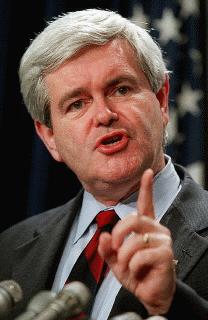
A formidable former lawmaker is considering entering the race for president in 2008.
He would bring up the level of the field on the Republican side substantially.
Former House speaker Newt Gingrich (R-Ga.) expects to run for president in 2008 if the contest for the Republican nomination still seems wide open late next year, he said yesterday.
In remarks that were critical of both parties' recent performance, Gingrich told a luncheon group of scholars and reporters at the Brookings Institution that he will make a decision in the fall of 2007 about running...
Gingrich's entry would shake up a Republican presidential field that now includes Sens. George Allen (Va.), Bill Frist (Tenn.) and John McCain (Ariz.). Many Republicans still revere Gingrich for engineering the GOP's takeover of Congress in 1994, though members of his own party pushed him to resign in 1998 after his drive to impeach President Bill Clinton cost them seats in that year's election.
The push for impeachment doubtlessly was a low point in his career.
When Americans look at the current roster of Republican and Democratic leaders, Gingrich said, they face an unappealing dilemma.
"We have a choice between those who are failing to deliver and those who are unthinkable," he said, adding that he would put "even money" on the Democrats taking back the House this fall. "Neither party currently is where the country is."
Gingrich also took a parting shot at Rep. Tom DeLay (R-Tex.), who retired from Congress this week after two of his top aides and a close associate, former lobbyist Jack Abramoff, pleaded guilty to corruption charges. Although DeLay embraced the nickname "The Hammer" while serving as both majority whip and majority leader, Gingrich said he favors a more tolerant form of leadership.
"The Gingrich model of an idea-led, contentious majority . . . is a lot better than a model of 'The Hammer.' A hammer is a relatively dumb symbol," he said, adding that now that DeLay is gone, "the House will become healthier with every passing week. You'll see an emergence of an idea-led Republican majority. The question is whether they'll do it fast enough to save the majority."
With electronic voting skullduggery always at the ready for the GOP, Gingrich need not worry overmuch about the Democrats taking the House (or Senate for that matter).
Friday, June 09, 2006
Specter Bill To Grant Blanket Amnesty To Anyone Who Participated In NSA Programs
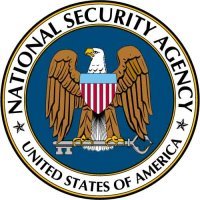
Sen. Arlen Specter's "compromise" with the administration over the extra-legal NSA warrantless surveillance programs involves granting a blanket amnesty to participants in the programs, according to the Washington Post.
The chairman of the Senate Judiciary Committee has proposed legislation that would give President Bush the option of seeking a warrant from a special court for an electronic surveillance program such as the one being conducted by the National Security Agency.
Sen. Arlen Specter's approach modifies his earlier position that the NSA eavesdropping program, which targets international telephone calls and e-mails in which one party is suspected of links to terrorists, must be subject to supervision by the secret court set up under the Foreign Intelligence Surveillance Act (FISA).
The new proposal specifies that it cannot "be construed to limit the constitutional authority of the President to gather foreign intelligence information or monitor the activities and communications of any person reasonably believed to be associated with a foreign enemy of the United States."...
Another part of the Specter bill would grant blanket amnesty to anyone who authorized warrantless surveillance under presidential authority, a provision that seems to ensure that no one would be held criminally liable if the current program is found illegal under present law.
A third provision would consolidate the 29 cases that have been filed in various federal district courts challenging the legality of the NSA program and give jurisdiction over them to the Foreign Intelligence Surveillance Court of Review, which was established by FISA. Any decision of that court would be subject to Supreme Court review and otherwise would be binding on all other courts.
Government Scientists Still Being Constrained In Public Communications

Following the uproar over the muzzling of NASA climate scientist James E. Hansen by the White House earlier this year, the space agency has stood up for it's scientists' attempts to communicate with the public.
Other agencies, however, have been less than supportive of their people educating the public when it comes to controversial topics.
The quality and credibility of government research are being jeopardized by inconsistent policies for communicating scientific findings to the public, says an independent group of scientists that advises Congress and the White House.
The group, the National Science Board, examined the issue at the request of Senator John McCain, Republican of Arizona. Mr. McCain sought the review in February after Civil Service workers and scientists at the National Aeronautics and Space Administration and other agencies complained publicly that political appointees had interfered with efforts to discuss global warming and other controversial issues.
The board canvassed an array of agencies like the space agency and the National Institutes of Health and found a lack of clear, consistent guidance to scientists and press offices on releasing information to the public and the news media.
In recent months, the board found, NASA and the National Oceanic and Atmospheric Administration have taken "steps in the right direction." But it said other agencies continued to lack consistent standards.
Where policies exist, the board said, they are often focused more on restricting scientists' ability to discuss their findings than on guaranteeing a free flow of information.
Thursday, June 08, 2006
Congress Gives FCC Right To Boost "Indecency" Fines

The culture wars between the good "decent" folks and the bad "free speech" forces got a big boost yesterday when the House signed off on a law, previously approved by the Senate, enabling the Federal Communications Commission to levy onerous fines against television and radio station owners that broadcast material that is found offensive.
The U.S. House today passed a bill to raise maximum fines 10-fold against broadcasters for airing indecent material, sending the measure to President George W. Bush to be signed into law.
The measure would boost to $325,000 the most the Federal Communications Commission can levy against TV and radio stations, including those owned by CBS Corp., News Corp.'s Fox and Clear Channel Communications Inc., for a single violation. The maximum for all violations on a single show would be $3 million.
House passage of the legislation, which cleared the Senate last month, caps a two-year effort by advocacy groups to reduce nudity, obscenity and sexual references on free, on-air television and radio. The penalties may hinder broadcasters' ability to compete with cable TV or satellite programmers such as XM Satellite Radio Holdings Inc., which aren't subject to indecency rules...
The push to increase sanctions from the current $32,500 maximum per violation gained momentum after CBS showed singer Janet Jackson's breast during the 2004 Super Bowl halftime show.
The Los Angeles-based Parents Television Council organized a campaign that led to the filing of more than a half million complaints with the FCC. The agency, then led by Michael Powell, proposed fining CBS $550,000, a penalty upheld last month by Chairman Kevin Martin.
The fake moralism shown by the pro-censorship politicians is pretty low. These lawmakers have no problem approving policies that result in the deaths and maimings of thousands, yet portray an occasional bare breast or lewd shock-jock bit as being "indecent."
Pathetic.
Bolton Whines About Comments By U.N. Official

The odious John Bolton can dish it out with the best of them. When it comes to catching heat, our U.N. ambassador's thin skin becomes apparent for all to see.
The U.S. ambassador rebuked the United Nations' second-highest-ranking official Wednesday for delivering a speech asserting that U.S. officials have undermined the world body by withholding support and failing to defend it from its harshest critics here.
Ambassador John R. Bolton called on Secretary General Kofi Annan to "repudiate" the speech given by his top aide, Deputy Secretary General Mark Malloch Brown, or live with "adverse" consequences.
"Even though the target of the speech was the United States, the victim, I fear, will be the United Nations," Bolton told reporters. "My hope is he looks at the potential adverse effect that these intemperate remarks would have on the organization" and repudiate them.
Bolton called Malloch Brown's speech a "very, very grave mistake," the worst by a U.N. official that he had seen in more than 15 years. He said the address, given in New York on Tuesday, represented a "condescending and patronizing" attack against the American people.
Annan dismissed Bolton's warning, saying that he "agrees with the thrust" of Malloch Brown's speech, according to U.N. spokesman Stephane Dujarric...
In his speech to a group of foreign policy experts, Malloch Brown said that the "prevailing practice of seeking to use the U.N. almost by stealth as a diplomatic tool while failing to stand up for it against its domestic critics is simply not sustainable. You will lose the U.N. one way or another."
Malloch Brown voiced frustration that the United Nations receives little gratitude, although it frequently advances U.S. policies from the Middle East to Africa, where it is currently organizing a U.N. peacekeeping operation in Sudan.
He said the United Nations' role is "in effect a secret in Middle America, even as it is highlighted in the Middle East and other parts of the world."
Malloch Brown said the United States has not done enough to highlight the United Nations' contributions, citing its role in managing 18 U.S.-backed peacekeeping operations.
"That is not well known or understood, because much of the public discourse that reaches the U.S. heartland has been largely abandoned to its loudest detractors, such as Rush Limbaugh and Fox News," he said...
The speech was an implicit criticism of Bolton's blunt diplomatic style, which contrasts with the traditional give-and-take of U.N. diplomacy. Malloch Brown urged the United States to show a greater willingness to compromise, citing its decision to threaten a possible end of funding to the United Nations if it does not embrace U.S.-backed reforms.
"No more take-it-or-leave-it, red-line demands thrown in without debate and engagement," he said. "In the eyes of the rest of the world, U.S. commitment tends to ebb much more than it flows. And in recent years, the enormously divisive issue of Iraq and the big stick of financial withholding have come to define an unhappy marriage."
The "grave mistake", to use the words of our ambassador, was when President Bush gave the recess appointment to the U.N. to a man as undiplomatic as John Bolton.
Wednesday, June 07, 2006
GOP Arguing Over Specifics Of Estate Tax Repeal

The politics surrounding the proposed repeal of the estate tax (or as the GOPers call it, the "death tax") has come down to two competing versions.
One favors the mega-rich, and exempts all wealth from the estate tax. The other plan exempts only (only?) the first $10 million of wealth and reduce the tax liability of everything over that from the claws of the IRS.
Senate Republicans are divided over whether to eliminate altogether the estate taxes on a small group of U.S. multimillionaires or just sharply reduce their tax liabilities at death.
Senate Majority Leader Bill Frist, a Tennessee Republican, will push this week for a permanent repeal of the tax, which is being temporarily phased out under President George W. Bush's 2001 tax cuts. The Senate is scheduled to begin debate on repeal today and may hold a first vote on the measure tomorrow.
Charles Grassley, the chairman of the Senate Finance Committee, said yesterday that Republicans are three or four votes shy of winning full repeal. He said they may be able to muster the 60 votes needed to pass an alternative measure that would exempt $10 million of a couple's estate from the tax. The plan would subject any amount above that to a 15 percent rate, or 31 percentage points lower than the current top rate of 46 percent...
The bipartisan congressional Joint Committee on Taxation estimated in 2005 that repealing the estate tax would cost the federal government more than $71.6 billion a year in lost revenue by 2015; the Treasury Department estimates the revenue loss at $65.8 billion that year. The alternative proposal to reduce the tax, championed by Arizona Republican Jon Kyl, would cost about $50 billion a year, according to the Tax Policy Center, a non-partisan Washington research institution...
Republican lawmakers refer to the levy as a ``death tax'' and hope that abolishing or reducing it will boost their appeal with voters in the closely contested November congressional elections. Although fewer than 1 percent of families are subject to the tax, critics such as Kyl say many small-business owners spend hundreds of thousands of dollars on lawyers and life insurance premiums to avoid paying it...
A few Republicans such as Senator George Voinovich of Ohio say they will vote against repealing the levy because of the ballooning government deficit, which is projected by the Congressional Budget Office to be about $300 billion this year. "We need the money," Voinovich said. "We can't afford to lose a dime right now. What we ought to be doing is asking for a temporary tax increase to pay for the war."...
Other Republicans who have opposed repealing the estate tax in the past include Arizona Senator John McCain, Maine Senator Olympia Snowe, and Rhode Island Senator Lincoln Chafee.
Proponents of keeping the tax include billionaire Warren Buffett, the chairman of Berkshire Hathaway Inc., and Bill Gates Sr., the father of Microsoft Corp. Chairman Bill Gates, the world's richest man.
It will be hilarious to see working-class Republicans defend the repeal of the "death tax." They must not realize that the ballooning federal deficit caused by lining the pockets of the rich will have to be paid back over the next decades by the children and grandchildren of the average American worker.
"Magic Bullet" Specter Cuts Deal With Cheney Over NSA Issue

Sen. Arlen "Magic Bullet" Specter has come through again for the administration.
A last-minute deal Tuesday with Vice President Cheney averted a possible confrontation between the Senate Judiciary Committee and U.S. telephone companies about the National Security Agency's database of customer calling records.
The deal was announced by Sen. Arlen Specter, R-Pa., the committee chairman, and Sen. Orrin Hatch, R-Utah. They said Cheney, who plays a key role supervising NSA counterterrorism efforts, promised that the Bush administration would consider legislation proposed by Specter that would place a domestic surveillance program under scrutiny of a special federal court.
In return, Specter agreed to postpone indefinitely asking executives from the nation's telecommunication companies to testify about another program in which the NSA collects records of domestic calls.
Great. Both publicly-known NSA warrantless surveillance programs already fall under the jurisdiction of FISA. Specter wants to modify the law so that the program will no longer be "extra-legal."
And if the telecoms weren't really cooperating in the program, why would Cheney have interfered with the Judiciary Committee's desire to call the telecom execs to the witness chair?
If passed, Specter's legislation would give the Foreign Intelligence Surveillance Court power to oversee the NSA program and render an opinion on the constitutionality of conducting domestic surveillance without a warrant. The court, established by the 1978 Foreign Intelligence Surveillance Act (FISA), normally considers case-by-case requests by intelligence agencies to conduct surveillance inside the USA.
The deal prompted protests from Democratic lawmakers, who said the Republican-controlled Congress had refused to challenge the administration's expansion of presidential authority. "Why don't we just recess for the rest of the year, and the vice president will just tell the nation what laws we'll have?" said Vermont Sen. Patrick Leahy, ranking Democrat on the committee.
Specter has challenged the administration to justify the legality of intelligence programs inside the country.
After the hearing, Specter said his hand had been forced by the telephone companies' refusal to discuss classified programs. Representatives of more than one company--which ones were not specified in the meeting--agreed to appear, Specter said, but told the panel they would not talk about classified information. Hatch said President Bush "is willing to work with us as long as it doesn't detract from the president's constitutional powers."
If the telcom executives could truthfully testify to no involvement in the NSA domestic programs--they would.
There wouldn't be any of this "refusal to discuss classified programs" if there weren't classified programs that the telecoms are protecting.
Tuesday, June 06, 2006
Depleted Brain Cells, Or More Evidence Of A Phony?

One could pick 100 people at random from the El Paso or San Antonio telephone books, give them a call, and -- including Spanish language-only homes -- find no more than three people who couldn't tell you the name of "America's Team."
From the transcript of President Bush's speech Friday welcoming the Super Bowl champion Pittsburgh Steelers to the White House: "I want to -- look, I was a Texas Cowboy fan, you know. (Laughter.) Dallas Cowboy fan..."
I wonder if the gooper apologists will counter that Bush was a professional baseball owner, and thus, naturally wouldn't be expected to know the name of the flagship NFL franchise in the state.
Thanks to Tom Shoop's Fedblog for finding this.
New Assertiveness By Congress and the Courts

After being walked on mercilessly, the other two "co-equal" branches of government are beginning to reassert their traditional checks and balances against the Bush administration proponents of unchecked executive powers.
After five years of a concerted White House campaign, there are tentative signs that Congress and the courts are beginning to push back against what has been the greatest expansion of presidential powers in a generation or more.
Those pushing back include some congressional Republicans and conservative jurists who have been among President Bush's chief allies. The efforts surely would intensify if Democrats won control of the House or Senate in November's elections -- and with it the power to convene hearings and issue subpoenas.
Here are some examples of the new assertiveness of the legislature:
●House Speaker Dennis Hastert and Democratic Leader Nancy Pelosi, usually at war, issued a joint statement denouncing the FBI search last month of Rep. William Jefferson's congressional office as a violation of the separation of powers between co-equal branches of government. Their ultimatum that seized documents be returned is now the subject of negotiations with the Justice Department, which is investigating bribery allegations against Jefferson, D-La.●The Senate Intelligence Committee voted 9-6 two weeks ago to demand that the administration notify all members of the committees about intelligence operations. The administration has bypassed the intelligence committees to inform only eight congressional leaders about such sensitive programs as the National Security Agency's warrantless-surveillance operation.
●Congressional Republicans and Democrats in March upended plans for a Dubai-owned company to take over some U.S. port operations, forcing the firm to promise to transfer the operations to a "U.S. entity." Outraged lawmakers weren't convinced when the president dismissed their national-security concerns as unfounded, and they weren't deterred when he threatened the first veto of his presidency to protect the deal.
●The White House and Congress continue to jockey over who has the last word on the treatment of terror suspects. Congress approved an amendment banning torture over the objections of Vice President Cheney. Bush signed the legislation in December but issued a "signing statement" in which he reserved the right to waive the ban, which he suggested violated his constitutional authority as commander in chief. Senate Armed Services Chairman John Warner of Virginia and Arizona Sen. John McCain of Arizona, both Republicans, then issued a joint statement vowing "strict oversight to monitor" implementation of the law.
The dispute has delayed the release of a new Army Field Manual on interrogation this spring. The Los Angeles Times reported Monday that several senators say the proposed manual sets standards for terror suspects that violate the congressional ban.
Unfortunately, there is a too large measure of restraint thrown in for good measure:
Congress generally hasn't used or even threatened to use its most potent weapons in a confrontation with the White House, such as issuing subpoenas or cutting off funding for programs.
Monday, June 05, 2006
Special Election To Pick Cunningham's Replacement Tomorrow

Lots of folks will be watching this election.
Voters in California's 50th Congressional District -- formerly represented by Republican Randy "Duke" Cunningham, who resigned after pleading guilty to taking bribes -- will vote tomorrow in a special election that is viewed as a bellwether on Republican chances to hold the House this fall. In any other year, former representative Brian Bilbray (R) would probably win the race handily in this GOP-leaning San Diego area district, but Democrat Francine Busby, a college professor, has mounted a serious challenge.Alabama, California, Iowa, Mississippi, Montana, New Jersey, New Mexico and South Dakota also have primaries tomorrow.
Sunday, June 04, 2006
Red States Still Fooled By Bush's "Faith"

Denial is more than just a river in Utah.
"When I watch him, I see a man with his heart in the right place," said Delia Randall, a 22-year-old mother from Provo, the hub of a county that gave Senator John Kerry just 11 percent of the presidential vote in 2004. "I like George Bush because he is God fearing, and that's how a lot of people in this area feel." ...
This core group is a highly concentrated version of the Bush base, one that appears to be motivated more by general principles and a comfort level with the president than by specific issues or political trends. They tend to be impressed by Mr. Bush's faith and convinced that he understands their lives and values. They like what they see as his muscular foreign policy.
The ubiquitous ROFLMAO somehow doesn't rise to this occasion.
These supporters are mostly clustered in places like Utah, Idaho and Wyoming, the only three states where Mr. Bush's job approval rating is at or above 50 percent, and in smaller pockets in areas like the suburbs of Birmingham, Ala.; northwest Georgia; and the Florida Panhandle.
"I'm against the war in Iraq -- and what happened with Hurricane Katrina, well, it was a failure by everybody," said Ron Craft, a sales manager in Provo who said he was a devout Mormon and a strong conservative who considered himself independent politically. "I tend to judge a person by their character. And President Bush reminds me of President Reagan. He's a man of principle."...
"He's strong, and he doesn't waver," said Jaren Olsen, 18, a freshman at Brigham Young, the nation's largest religiously affiliated private university, who is from Albany. "I like that he is for the family, that marriage should only be between a man and woman. And the war, we need to finish what we started."
It is doubtful whether many people would attach their name to such a statement as uttered by Mr. Olsen.
BYU must be proud of it's student body:
Another student at Brigham Young, Danielle Pulsipher, a junior, offered blanket approval of the president. Asked to name which of his actions as president she liked most, she was hard-pressed to answer.
"I'm not sure of anything he's done, but I like that he's religious -- that's really important," Ms. Pulsipher said.
The saddest part of this story is that these people -- if shameless enough to make comments like this to a reporter for a major newspaper -- probably have no qualms about voting their ignorance.
Saturday, June 03, 2006
Activities Of Top Female Lobbyist Scrutinized
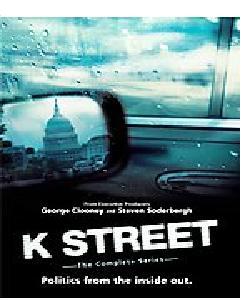
A former top aide to Rep. Jerry Lewis (R-CA) who later became a leading lobbyist in Washington is having her influence over the appropriations process investigated according to the New York Times.
Federal prosecutors are investigating whether Mr. Lewis and other lawmakers may have traded earmarks for illicit payments from lobbyists and contractors--an outgrowth of the bribery indictment of Randy Cunningham, a former congressman from California...
(F)ederal officials who have been briefed on it say prosecutors are looking into Letitia Hoadley White's ties to Mr. Lewis, her old boss, and to his friend Bill Lowery, a former California congressman who is now Ms. White's lobbying partner.
While working for Mr. Lewis, Ms. White helped direct several hundred million dollars in contracts to clients of Mr. Lowery's firm. The firm and its clients, meanwhile, accounted for more than a third of the $1.3 million Mr. Lewis's political action committee has raised since 2000.
On Thursday, one of Ms. White's clients, San Bernardino County, Calif., said it had received a subpoena from prosecutors seeking information about its dealings with her firm and with Mr. Lewis and his staff members...
After Republicans took control of the House in 1994, Mr. Lewis became chairman of the housing and veterans affairs appropriations subcommittee, leaving five years later to become chairman of the defense subcommittee. Such subcommittee chairmen are known as cardinals because of their power over large parts of the federal budget. Among other things, only the cardinals and their top aides see each member's requests for earmarks, and only the cardinals have the authority to approve their insertion into the House spending bills.
As the top aide representing Mr. Lewis's office on the appropriations committee, Ms. White was responsible for presenting earmark requests from him and other House members to the staff members who wrote the bills, and she sometimes acted as a gatekeeper to Mr. Lewis for those seeking money. She found herself fielding calls from scores of lawmakers and lobbyists, all seeking money for favored hospitals or military contractors. Mr. Cunningham was among the many members presenting earmark requests to her and the committee.
And Brent R. Wilkes, one of the contractors said to have bribed Mr. Cunningham, as well as Mr. Lowery, who lobbied for Mr. Wilkes, both lavished Ms. White with attention. They often bought her dinners and bottles of wine, two former associates of Mr. Wilkes recalled, speaking on condition of anonymity because of the federal investigation. "She was the queen bee," one said. Other lobbyists all over Washington also sought to cozy up to Ms. White because of her position on the committee staff.
By 1999, when Mr. Lewis had assumed control of the $300 billion defense subcommittee, Ms. White's influence with him had become a subject of some discussion on K Street. A small military contractor, Recon/Optical, which benefited from Mr. Lewis's earmarks, filed a lawsuit charging, among other things, that an official of Lockheed Martin had asserted that Ms. White "controls" Mr. Lewis and that a friend of hers who lobbied for Recon had swayed her on its behalf. The suit said the Lockheed official had threatened to withhold certain payments unless Recon "shuts up" Ms. White.
Friday, June 02, 2006
Tobacco Settlement Skullduggery
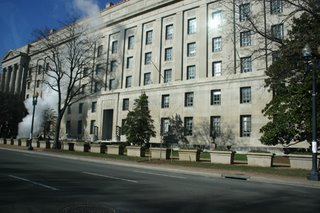
When the Justice Department--on their own volition--decided to accept only S10 billion instead of $130 billion in the settlement with big tobacco companies, ugly rumors began to circulate in Washington.
A federal judge ruled yesterday that Associate Attorney General Robert D. McCallum Jr. must undergo questioning in a lawsuit by a nonprofit group seeking records about the Justice Department's conduct in a landmark case against the tobacco industry.
Citizens for Responsibility and Ethics in Washington sued last year after the department ignored the testimony of one of its own witnesses in the tobacco trial and reduced the amount the Bush administration is seeking from the tobacco industry from $130 billion to $10 billion.
CREW said the department has failed to produce a single responsive document to demands for information under the Freedom of Information Act.
U.S. District Judge Emmet Sullivan said the organization is entitled to delve into the department's handling of the document requests by questioning McCallum, the third-ranking official at the Justice Department, who is at the center of allegations that the administration caved in to the tobacco industry in reducing the amount of money it is seeking.
Sullivan's decision is the latest problem related to McCallum's nomination as the Bush administration's choice to become ambassador to Australia. Sen. Richard J. Durbin (D-Ill.) is blocking McCallum's nomination over allegations that he improperly influenced the government's lawsuit against cigarette manufacturers...
In its lawsuit filed in October, CREW asked for records of all contacts between Justice Department officials and the White House concerning the tobacco litigation and records of all contacts between McCallum and his old law firm in Atlanta, which has done work for the tobacco industry.
Federal Elections Commission Fines Frist Campaign
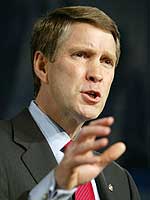
The FEC is just now getting around to fining Sen. Bill Frist's 2000 campaign for engaging in loan reporting skullduggery.
The Federal Election Commission has determined that Senate Majority Leader Bill Frist's 2000 Senate campaign violated federal campaign finance laws.
The federal agency fined Frist 2000 Inc. $11,000, according to a lawyer representing Frist's campaign and a watchdog group. Citizens for Responsibility and Ethics in Washington had filed a complaint last year against Frist's 2000 campaign committee and received the FEC's findings yesterday.
The FEC found that Frist 2000 Inc. failed to disclose a $1.44 million loan taken out jointly by the campaign and Frist's 1994 campaign committee.
The Tennessee Republican, who was elected to the Senate in 1994, is not seeking a third term and is weighing a possible bid for the presidency in 2008.
Federal law requires full disclosure of any loans taken out by campaign committees. Frist's 1994 campaign committee did disclose the loan to the FEC in January 2001, but the 2000 campaign did not, according to the FEC.
In an agreement reached with the Frist campaign committee, the agency said Frist 2000 Inc. violated the law by failing to report the loan in its January 2001 campaign finance report and did not properly report the repayment of the loan in a July 2001 report.
Thursday, June 01, 2006
"Coingate" Figure Pleads Guilty To Illegal Contributions To Bush/Cheney Campaign

The GOP is usually not so sloppy in it's fundraising.
A coin dealer and prominent GOP fundraiser at the center of an Ohio political scandal pleaded guilty Wednesday to federal charges that he illegally funneled about $45,000 to President Bush's reelection campaign.
Tom Noe, who also raised money for Ohio Republicans, also is charged with embezzlement in an ill-fated $50 million coin investment that he managed for the state workers' compensation fund.
The investment scandal has been a major embarrassment for Ohio's ruling Republicans and has given Democrats a better shot at winning state offices this year, including the governor's office, which has been under GOP control since 1991.
Investigators do not know whether Noe used money from the coin fund for campaign donations.
Noe was charged with exceeding federal campaign contribution limits, using others to make the contributions and causing the Bush campaign to submit a false campaign-finance statement.
Noe was not only generous to the Bush/Cheney campaign, but liked to spread the largesse around.
Investigations into Noe's coin investment led to Gov. Bob Taft's no-contest plea to and conviction in August on charges he accepted golf outings and other gifts that he did not report.
Noe personally gave more than $105,000 to Republicans during the 2004 campaign, including donations to Bush and Taft.
The Bush-Cheney campaign donated $6,000 it received from Noe and his wife to charity. The rest of the money donated at the 2003 Bush fundraiser remains with the Republican Party.
The motto of the Ohio Republican Party should have been "Just Say Noe."


